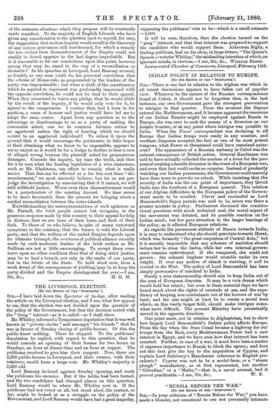INDIAN POLICY IN RELATION TO EUROPE.
(To THE EDITOR OF THE" SyeareaOr."1 SIR,—There is one fact in relation to the Afghan war which in- all recent discussions appears to have fallen out of popular view. Whatever be the nature of the Russian correspondence found at Cabal, it should not be forgotten that, in the last instance, our own Government gave the strongest provocation to intrigue in that quarter. From the moment the Sepoys entered the Mediterranean, and it became apparent the resources of our Indian Empire might be employed against Russia in, Europe, she was sure to seek the means of a diversion on our Asiatic frontier, or at any point where intrigue was possible in, India. When the Times' correspondent was declaring to all Europe that Indian troops were ready in any number, and exultant Jingoism accepted the fact as one of its most potent weapons, what Power so threatened could have remained quies- cent ? The appearance of a Russian embassy in Cabal was the natural consequence of British action. General Kaufmann was said to have actually collected the nucleus of a force for the pur- pose:of creating a hostile diversion in the event of aEuropean war,. and even that fact could excite no surprise. Instead of prudently watching our Indian possessions, the Government could scarcely have done more to provoke an attack. While insisting that the security of India was the one point of importance, they thrust India into the forefront of a European quarrel. This relation of our Afghan difficulties to the European policy of the Govern- ment needs to be recalled. Clever and successful as Lord. Beaconsfield's Sepoy parade was said to be, never was there a greater mistake in policy. Parliament discussed the constitu- tional questions with much technical zeal, the moral aspect of the movement was debated, and its possible reaction on the Indian mind; but few gave attention to the larger bearings of the policy, as it affected European relations. As regards the permanent attitude of Russia towards India,. it is easy to understand why she should gravitate towards Herat,. which was formerly "the great emporium of Central Asia," but it is morally impossible that any schemes of ambition should induce her to cross the Indus, while her own internal govern- ment remains undeveloped. If she conquered, she could not govern : the colossal bugbear would crumble under its own weight. If ever any motive of attack is wanting, it will be- created in the West. The policy of Lord Beaconsfield has been_ simply provocative of mischief to India.
Surely a wise statesmanship should aim to keep India out of the area of European disputes. It may be a vain dream which would hold her intact; but even in these material days we have- heard much about the rights of neutrals at sea, and the expe- diency of keeping non-combatants out of the horrors of war by land; and the aim might at least be to create a moral tone which, on this vastly larger field, should make intrigue some- what more difficult. The present Ministry have persistently moved in the opposite direction.
One point more, not in relation to Afghanistan, but to show how largely Lord Beaconsfield's Indian policy affects Europe. From the day when the Suez Canal became a highway for our troops from the East, every Mediterranean Power had a new interest in Egypt, and we have seen how that interest has been. asserted. Further, in case of a war, it must have been a matter of supreme importance to Russia to block the egress; and does not this fact give the key to the acquisition of Cyprus, and explain Lord Salisbury's Manchester reference to English pre- cedents? Cyprus was not to be a model farm, or a " steam plough" manufactory, as at first represented, but another "Gibraltar," or a "Malta,"—that is, a naval arsenal, had it proved practicable.—I am, Sir, ctc., W. S.


































 Previous page
Previous page